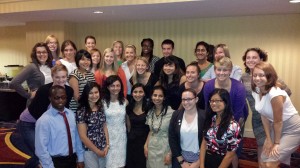Emily, a second year medical student, was a participant in MSFC’s most recent Abortion Training Institute in Philadelphia, PA. At the ATI, medical students work with reproductive health experts in small-group workshops to learn about abortion and contraception.
Last year, a colleague in my medical school class asked me about the MVA (Manual Vacuum Aspiration, a common abortion procedure) workshop that our school’s Medical Students for Choice chapter had recently hosted. He assured me that he himself was very liberal, but I should know that we had really upset some people in our class.
The room we reserved for the workshop was packed and we had to bring in extra chairs from adjacent classrooms. In the end, we actually had little time for the MVA demonstration because the residents who were leading our workshop took so many questions- about anatomy, about risks, about medication abortion. I think the really upsetting part of the story is actually that medical students in a country where abortion is legal and is one of the most common medical procedures didn’t know the realities of first trimester abortions.
After an entire year of medical education: gross anatomy, embryology, biochemistry, physiology, immunology, I still didn’t have the knowledge or skills to talk about abortion with my fellow students or future patients. This is the reason I applied for the Abortion Training Institute hosted by Medical Students for Choice.
The Institute certainly gave me the information that I needed. I now feel confident describing what occurs in first trimester and second trimester procedures. I am poised to discuss abortion education and access with classmates and faculty. I am better suited to offer options counseling to my patients. The opportunity to have conversations with students and providers from around the country was so empowering.
I am thankful for the honesty with which each of the providers and faculty answered our questions – perhaps we all felt that the topic and our future patients deserved our humility, tact, and openness. My favorite part of the weekend was the opportunity to meet and learn from the medical director of South Wind Women’s Center in Wichita, KS. Her remarks and her career as a provider and advocate for her patients have strengthened my passion for a primary care career.
The Abortion Training Institute solidified my commitment to practice family medicine in marginalized communities and align my practice with anti-poverty work. There is a great need for physicians to provide a full array of reproductive health services. The number of poor individuals seeking abortions is increasing. And the burdens of travel, procedure cost, and wait times are unbearable for those living in poverty. My dream for the future of US healthcare is a single payer system, where everyone has access to full spectrum healthcare, including contraception and abortion coverage.
I am thankful that Medical Students for Choice exists to fill the gaps in my medical education; I encourage others to join the network of students and providers, to use their resources to have workshops on your campuses, and to attend conferences like the Abortion Training Institute. Replacing misinformation and fear with education and understanding is paramount for the future of medical education and the reproductive health of our patients.
